27 April was a defining moment in the country’s calendar, marking the nation’s first democratic elections. For the first time South Africans of all races were able to cast their vote and have a say in who would govern the country. Following the ANC’s victory in the elections, Nelson Mandela became the first democratically elected President of South Africa.
The horizontal “Y” shaped flag with its red, white, green, yellow, black and blue colours became a symbol of national unity. The occasion marked a new beginning for a nation bruised by years of segregation and inequality. The new flag replaced the one that had been used since 1928.
Over the past two decades, the South African flag has become a regular feature during major events hosted in the country and it can be seen flying at every public building.
Who can forget the throngs of people at Ellis Park Stadium, who chanted ‘Nelson, Nelson, Nelson’ as former President Mandela entered the stadium to congratulate the Springboks on their victory over New Zealand during the 1995 World Cup final?
It was a unifying moment for South Africa. Black people had a historic dislike for the Springboks, a team they associated with apartheid. But Mandela chose to wear a Springbok jersey and cap on that day to foster unity and reconciliation among South Africans of all race groups. It was a classic moment that will remain in the minds of many South Africans for years to come.
Mandela and Springbok captain Francois Pienaar’s involvement in the World Cup is the subject of the 2009 film Invictus.
The TRC was based on the final clause of the Interim Constitution of 1993 and passed in Parliament as the Promotion of National Unity and Reconciliation Act, No 34 of 1995. It was set up by the Government of National Unity to help deal with what happened under apartheid. Even though the injustices of the past could not be undone; even though families had lost loved ones, it was felt that the only way to heal as a country was to confront the past, ugly as it was. The TRC provided healing for a nation wounded by years of conflict and exploitation.
That same year, South Africa shone on the sports front with Bafana Bafana winning the African Cup of Nations tournament, which the country hosted.
Penny Heyns also won both the 100m and 200m breaststroke events at the Atlanta Olympic Games. It was the first time democratic South Africa participated in the Olympics and Heyns’ performance in the pool made her the country’s first post-apartheid Olympic gold medallist. On the track, Josia Thugwane also did the country proud by winning a gold medal at his first attempt. Thugwane won the gold medal in the marathon becoming the first black athlete to earn an Olympic gold for South Africa.
1997: The new constitution
On 4 February 1997, the new Constitution of the Republic of South Africa came into effect. The country’s Constitution has been hailed as one of the most progressive in the world. It was approved by the Constitutional Court on 4 December 1996 and signed by former President Mandela at Sharpeville on 10 December 1996.
Among the laws contained in the Constitution is the Bill of Rights, which is the cornerstone of democracy in South Africa. It enshrines the rights of all people in South Africa and affirms the democratic values of human dignity, equality and freedom.
1997: National anthem adopted
There are very few South Africans who can- not sing the national anthem in full. Even for those who struggle, it’s probably a matter of pronunciation. Ask any South African; 20 years into democracy, the national anthem is a widely accepted national song. We are probably the only country in the world to incorporate different languages in one national anthem - another unique South African experience. The South African national anthem is a ‘rainbow’ in its own right, as it combines the new English lyrics adopted in 1997 with extracts of the old hymn Nkosi Sikelel’ iAfrika and parts of the Afrikaans version Die Stem van Suid-Afrika.
1998: TRC final report
South Africa’s TRC delivered its final 3 500-page report to President Mandela on 31 July 1998. It was based on years of testimony from the people who ran the 1960-1994 white-government and their victims.
1999: Elections
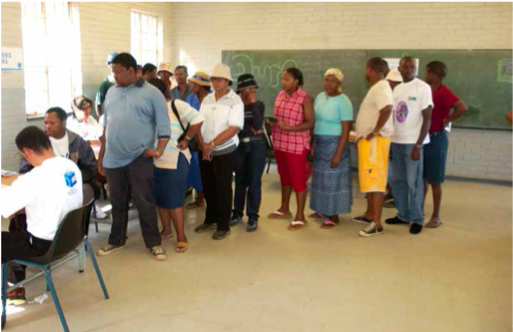 President Mandela announced 2 June as the date for South Africa’s second democratic election, a vote that marked his retirement from office. Thabo Mbeki became South Africa’s second democratically elected President. The Democratic Party became the largest opposition party, after being the 5th largest party in the 1994 elections and the number of parties represented in the National Assembly increased to 13.
President Mandela announced 2 June as the date for South Africa’s second democratic election, a vote that marked his retirement from office. Thabo Mbeki became South Africa’s second democratically elected President. The Democratic Party became the largest opposition party, after being the 5th largest party in the 1994 elections and the number of parties represented in the National Assembly increased to 13.
2000: Coat of Arms adopted
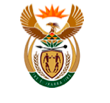 On 27 April a new Coat of Arms was introduced. The motto, !ke e: /xarra //keis, is written in the Khoisan language of the /Xam people and translates literally to “diverse people unite”. The new Coat of Arms replaced the one that served South Africa since 17 September 1910. The change reflected government’s aim to highlight the democratic change in South Africa and a new sense of patriotism.
On 27 April a new Coat of Arms was introduced. The motto, !ke e: /xarra //keis, is written in the Khoisan language of the /Xam people and translates literally to “diverse people unite”. The new Coat of Arms replaced the one that served South Africa since 17 September 1910. The change reflected government’s aim to highlight the democratic change in South Africa and a new sense of patriotism.
2001: World Conference against Racism
The country hosted the World Conference against Racism (WCAR) at the Durban International Convention Centre from 31 August – 8 September. The conference, also known as Durban I, dealt with several controversial issues, including compensation for slavery and the actions of Israel.
2002: Hector Pieterson Museum opens in Soweto
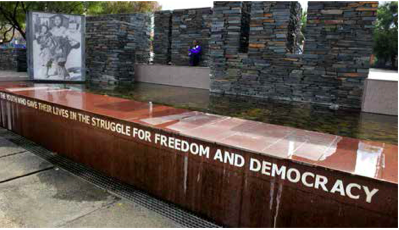 The Hector Pieterson Museum is named after one of the first casualties of the march through Soweto on 16 June 1976, when police shot at demonstrating students. Pieterson was only 13 years old when he was shot dead by police.
The Hector Pieterson Museum is named after one of the first casualties of the march through Soweto on 16 June 1976, when police shot at demonstrating students. Pieterson was only 13 years old when he was shot dead by police.
2002: First South African in space
In April 2002, Mark Shuttleworth became the first South African in space. He was a member of the crew of Soyuz mission TM34 to the International Space Station. Shuttleworth spent eight days aboard the space station, where he conducted scientific experiments for South Africa.
2003: Cricket World Cup
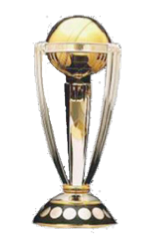 The 2003 International Cricket Council (ICC) Cricket World Cup was co-hosted by South Africa, Zimbabwe and Kenya. This edition of the World Cup was the first to be played on African soil. In the final, Australia made 359 runs for the loss of two wickets - the largest ever total in a final – defeating India by 125 runs.
The 2003 International Cricket Council (ICC) Cricket World Cup was co-hosted by South Africa, Zimbabwe and Kenya. This edition of the World Cup was the first to be played on African soil. In the final, Australia made 359 runs for the loss of two wickets - the largest ever total in a final – defeating India by 125 runs.
2003: Sibusiso Vilane conquers Everest
In March 2003, Sibusiso Vilane became the first black African to summit Mount Everest. He earned the praise of the then President Mbeki for his achievement and was later awarded the Order of Ikhamanga (Bronze).
2004: Elections
South Africa held its third democratic election, which marked a decade of democracy. A total of 20.6 mil- lion people registered to vote, making it two million more than the 1999 elections. Approximately 76 per cent of the registered voters cast their ballots. The ANC received 67.7 per cent of the votes. President Thabo Mbeki was inaugurated for a second term in office.
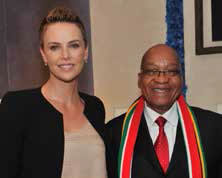 2004: Charlize Theron wins an Oscar
2004: Charlize Theron wins an Oscar
South African born Hollywood actress Charlize Theron made the country proud when she won an Oscar for her role in the movie “Monster” on 29 February 2004. She became the first African to win the award.
2005: 50th anniversary of Freedom Charter
The Freedom Charter was the statement of core principles of the South African Congress Alliance, which consisted of the ANC and its allies - the South African Indian Congress the South African Congress of Democrats and the Coloured People’s Congress. It was adopted in Kliptown in 1955 and declared ‘The People Shall Govern!’
2006: Same-sex marriages legalised
South Africa’s Cabinet gave the green light for a bill allowing same-sex marriages, which made it the first country in Africa and fifth country in the world to give homosexual couples the same rights as their straight counterparts, allowing legal marriages between same-sex couples with the promulgation of the Civil Unions Act. On 30 November 2006, South Africa legalised same sex marriages.
2006: Another Oscar
The same year, South African film, Tsotsi, won an Oscar.
2007: Rugby World Cup
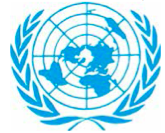 The Springboks won the Rugby World Cup for the second time, beating England (15-6) in final at the Stade France in Paris.
The Springboks won the Rugby World Cup for the second time, beating England (15-6) in final at the Stade France in Paris.
2007: United Nations Security Council seat
South Africa officially assumed its seat as a non-permanent member of the United Nations Security Council following elections held on 16 October 2006 at the United Nations General Assembly.
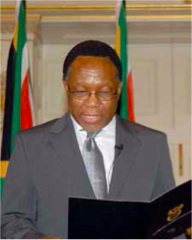 South Africa was selected for the fi time as a non-permanent member of the United Nations Security Council for the period 2007/08.
South Africa was selected for the fi time as a non-permanent member of the United Nations Security Council for the period 2007/08.
2008: Kgalema Motlanthe becomes President
On 25 September, Kgalema Motlanthe was elected as president of the country after Thabo Mbeki resigned as President, nine months before his second term of office expired.
2009: Mandela day launched
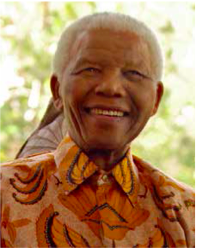 Nelson Mandela’s 91st birthday also marked the inaugural Mandela Day. After the success of this first Mandela Day, the United Nations adopted it as a day for global humanitarian action, calling it Nelson Mandela International Day.
Nelson Mandela’s 91st birthday also marked the inaugural Mandela Day. After the success of this first Mandela Day, the United Nations adopted it as a day for global humanitarian action, calling it Nelson Mandela International Day.
SA goes to the polls
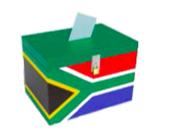 South Africans voted for the 4th time in 2009 general elections and Jacob Zuma was elected President.
South Africans voted for the 4th time in 2009 general elections and Jacob Zuma was elected President.
2010: FIFA World Cup
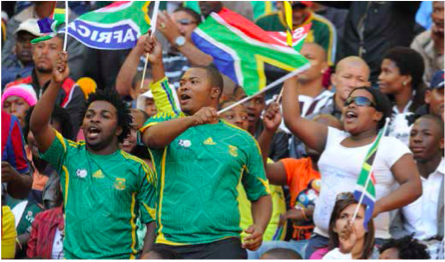 On June 11, the FIFA World Cup kicked off at the packed Soccer City stadium in Johannesburg, with hosts South Africa taking on Mexico. South Africa got its continent’s first World Cup off to a thrilling start by scoring the tournament’s opening goal in a spirited 1-1 draw with Mexico. Approximately 85 000 spectators attended the match, while millions more watched on public viewing screens all over the country.
On June 11, the FIFA World Cup kicked off at the packed Soccer City stadium in Johannesburg, with hosts South Africa taking on Mexico. South Africa got its continent’s first World Cup off to a thrilling start by scoring the tournament’s opening goal in a spirited 1-1 draw with Mexico. Approximately 85 000 spectators attended the match, while millions more watched on public viewing screens all over the country.
2011: Census
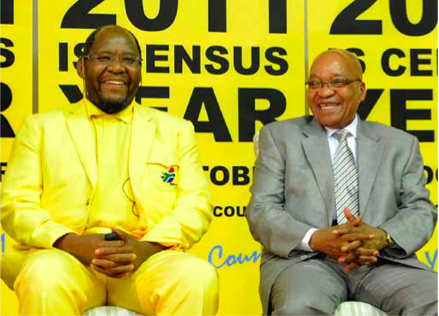 South Africa conducted its third census. In October 2012, Statistics South Africa (Stats SA) released the results of its 2011 census, the third official census since the advent of democracy. It revealed that between the first and the third post-apartheid census, the population grew by just over 11 million to 51.7 million and 79.6 per cent of the population is black.
South Africa conducted its third census. In October 2012, Statistics South Africa (Stats SA) released the results of its 2011 census, the third official census since the advent of democracy. It revealed that between the first and the third post-apartheid census, the population grew by just over 11 million to 51.7 million and 79.6 per cent of the population is black.
2012: SKA
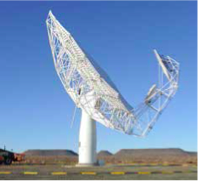 On 25 May, members of the Square Kilometre Array (SKA) Organisation announced that the SKA telescope would be split between Africa and Australia, with a majority share of the telescope destined to be built in South Africa. All the dishes and the mid frequency aperture arrays for Phase II of the SKA will be built in Southern Africa.
On 25 May, members of the Square Kilometre Array (SKA) Organisation announced that the SKA telescope would be split between Africa and Australia, with a majority share of the telescope destined to be built in South Africa. All the dishes and the mid frequency aperture arrays for Phase II of the SKA will be built in Southern Africa.
2012: BRICS
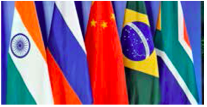 That same year, South Africa was formally invited to become the fifth member of BRIC, the acronym for the association of four major emerging national economies including Brazil, Russia, India and China. With the addition of South Africa, the bloc expanded its name to BRICS.
That same year, South Africa was formally invited to become the fifth member of BRIC, the acronym for the association of four major emerging national economies including Brazil, Russia, India and China. With the addition of South Africa, the bloc expanded its name to BRICS.
2013: Africa Cup of Nations
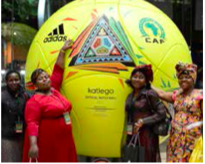 South Africa hosted the 2013 Africa Cup of Nations, also known as the Orange Africa Cup of Nations, for the second time after the original host Libya was stripped of its hosting rights due to the Libyan civil war. It was the 29th Africa Cup of Nations the football championship of Africa organised by the Confederation of African Football (CAF)
South Africa hosted the 2013 Africa Cup of Nations, also known as the Orange Africa Cup of Nations, for the second time after the original host Libya was stripped of its hosting rights due to the Libyan civil war. It was the 29th Africa Cup of Nations the football championship of Africa organised by the Confederation of African Football (CAF)
2013: Nelson Mandela dies
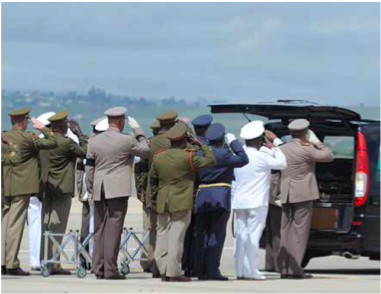 A sad day in the history of South Africa and the world, 5 December, as South Africa’s first democratically elected President Nelson Mandela passed away. He was buried in Qunu in the Eastern Cape on 15 December 2013.
A sad day in the history of South Africa and the world, 5 December, as South Africa’s first democratically elected President Nelson Mandela passed away. He was buried in Qunu in the Eastern Cape on 15 December 2013.
2014: Elections
 South Africa held its 5th democratic election on 7 May, as the country marked 20 years of Freedom. The election, which saw the ANC emerge victorious, was declared free and fair. Jacob Zuma was elected President for the second time and was inaugurated on in front of thousands of well wishers at the Unions Buildings on 24 May.
South Africa held its 5th democratic election on 7 May, as the country marked 20 years of Freedom. The election, which saw the ANC emerge victorious, was declared free and fair. Jacob Zuma was elected President for the second time and was inaugurated on in front of thousands of well wishers at the Unions Buildings on 24 May.
(Additional information sourced from South African History Online, Brand SA and gov.za)
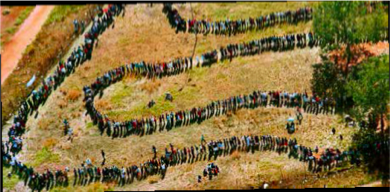 1994: South Africa’s first democratic elections
1994: South Africa’s first democratic elections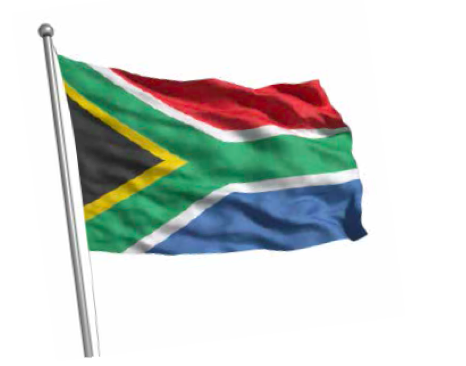 One of the symbolic moments in 1994 was no doubt the adoption of the National Flag.
One of the symbolic moments in 1994 was no doubt the adoption of the National Flag.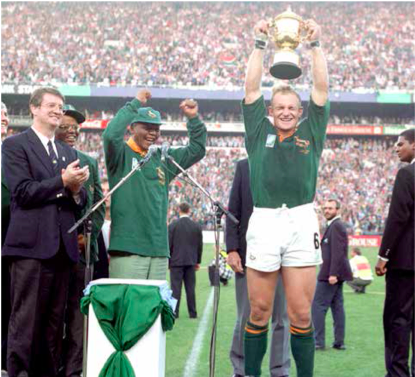
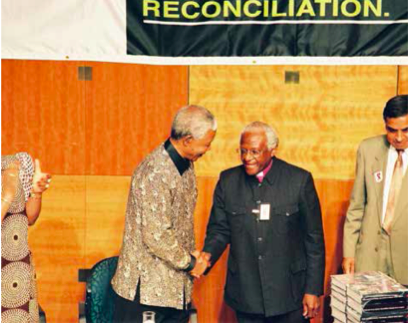 It was the Truth and Reconciliation Commission (TRC) of 1996 that made many of us realise that the truth really hurts. But as hurtful as it was, it was probably the process of the TRC that truly made South Africa’s transition from apartheid to democracy a unique experience, one that remains the model of the continent of Africa to this day.
It was the Truth and Reconciliation Commission (TRC) of 1996 that made many of us realise that the truth really hurts. But as hurtful as it was, it was probably the process of the TRC that truly made South Africa’s transition from apartheid to democracy a unique experience, one that remains the model of the continent of Africa to this day.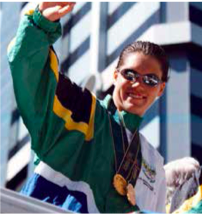
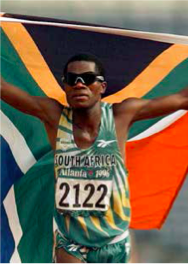
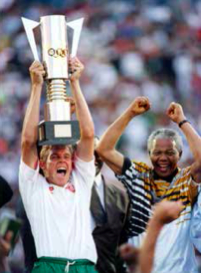
 President Mandela announced 2 June as the date for South Africa’s second democratic election, a vote that marked his retirement from office. Thabo Mbeki became South Africa’s second democratically elected President. The Democratic Party became the largest opposition party, after being the 5th largest party in the 1994 elections and the number of parties represented in the National Assembly increased to 13.
President Mandela announced 2 June as the date for South Africa’s second democratic election, a vote that marked his retirement from office. Thabo Mbeki became South Africa’s second democratically elected President. The Democratic Party became the largest opposition party, after being the 5th largest party in the 1994 elections and the number of parties represented in the National Assembly increased to 13. On 27 April a new Coat of Arms was introduced. The motto, !ke e: /xarra //keis, is written in the Khoisan language of the /Xam people and translates literally to “diverse people unite”. The new Coat of Arms replaced the one that served South Africa since 17 September 1910. The change reflected government’s aim to highlight the democratic change in South Africa and a new sense of patriotism.
On 27 April a new Coat of Arms was introduced. The motto, !ke e: /xarra //keis, is written in the Khoisan language of the /Xam people and translates literally to “diverse people unite”. The new Coat of Arms replaced the one that served South Africa since 17 September 1910. The change reflected government’s aim to highlight the democratic change in South Africa and a new sense of patriotism. The Hector Pieterson Museum is named after one of the first casualties of the march through Soweto on 16 June 1976, when police shot at demonstrating students. Pieterson was only 13 years old when he was shot dead by police.
The Hector Pieterson Museum is named after one of the first casualties of the march through Soweto on 16 June 1976, when police shot at demonstrating students. Pieterson was only 13 years old when he was shot dead by police. The 2003 International Cricket Council (ICC) Cricket World Cup was co-hosted by South Africa, Zimbabwe and Kenya. This edition of the World Cup was the first to be played on African soil. In the final, Australia made 359 runs for the loss of two wickets - the largest ever total in a final – defeating India by 125 runs.
The 2003 International Cricket Council (ICC) Cricket World Cup was co-hosted by South Africa, Zimbabwe and Kenya. This edition of the World Cup was the first to be played on African soil. In the final, Australia made 359 runs for the loss of two wickets - the largest ever total in a final – defeating India by 125 runs. 2004: Charlize Theron wins an Oscar
2004: Charlize Theron wins an Oscar The Springboks won the Rugby World Cup for the second time, beating England (15-6) in final at the Stade France in Paris.
The Springboks won the Rugby World Cup for the second time, beating England (15-6) in final at the Stade France in Paris. South Africa was selected for the fi time as a non-permanent member of the United Nations Security Council for the period 2007/08.
South Africa was selected for the fi time as a non-permanent member of the United Nations Security Council for the period 2007/08. Nelson Mandela’s 91st birthday also marked the inaugural Mandela Day. After the success of this first Mandela Day, the United Nations adopted it as a day for global humanitarian action, calling it Nelson Mandela International Day.
Nelson Mandela’s 91st birthday also marked the inaugural Mandela Day. After the success of this first Mandela Day, the United Nations adopted it as a day for global humanitarian action, calling it Nelson Mandela International Day. South Africans voted for the 4th time in 2009 general elections and Jacob Zuma was elected President.
South Africans voted for the 4th time in 2009 general elections and Jacob Zuma was elected President. On June 11, the FIFA World Cup kicked off at the packed Soccer City stadium in Johannesburg, with hosts South Africa taking on Mexico. South Africa got its continent’s first World Cup off to a thrilling start by scoring the tournament’s opening goal in a spirited 1-1 draw with Mexico. Approximately 85 000 spectators attended the match, while millions more watched on public viewing screens all over the country.
On June 11, the FIFA World Cup kicked off at the packed Soccer City stadium in Johannesburg, with hosts South Africa taking on Mexico. South Africa got its continent’s first World Cup off to a thrilling start by scoring the tournament’s opening goal in a spirited 1-1 draw with Mexico. Approximately 85 000 spectators attended the match, while millions more watched on public viewing screens all over the country. South Africa conducted its third census. In October 2012, Statistics South Africa (Stats SA) released the results of its 2011 census, the third official census since the advent of democracy. It revealed that between the first and the third post-apartheid census, the population grew by just over 11 million to 51.7 million and 79.6 per cent of the population is black.
South Africa conducted its third census. In October 2012, Statistics South Africa (Stats SA) released the results of its 2011 census, the third official census since the advent of democracy. It revealed that between the first and the third post-apartheid census, the population grew by just over 11 million to 51.7 million and 79.6 per cent of the population is black. On 25 May, members of the Square Kilometre Array (SKA) Organisation announced that the SKA telescope would be split between Africa and Australia, with a majority share of the telescope destined to be built in South Africa. All the dishes and the mid frequency aperture arrays for Phase II of the SKA will be built in Southern Africa.
On 25 May, members of the Square Kilometre Array (SKA) Organisation announced that the SKA telescope would be split between Africa and Australia, with a majority share of the telescope destined to be built in South Africa. All the dishes and the mid frequency aperture arrays for Phase II of the SKA will be built in Southern Africa. That same year, South Africa was formally invited to become the fifth member of BRIC, the acronym for the association of four major emerging national economies including Brazil, Russia, India and China. With the addition of South Africa, the bloc expanded its name to BRICS.
That same year, South Africa was formally invited to become the fifth member of BRIC, the acronym for the association of four major emerging national economies including Brazil, Russia, India and China. With the addition of South Africa, the bloc expanded its name to BRICS. South Africa hosted the 2013 Africa Cup of Nations, also known as the Orange Africa Cup of Nations, for the second time after the original host Libya was stripped of its hosting rights due to the Libyan civil war. It was the 29th Africa Cup of Nations the football championship of Africa organised by the Confederation of African Football (CAF)
South Africa hosted the 2013 Africa Cup of Nations, also known as the Orange Africa Cup of Nations, for the second time after the original host Libya was stripped of its hosting rights due to the Libyan civil war. It was the 29th Africa Cup of Nations the football championship of Africa organised by the Confederation of African Football (CAF) A sad day in the history of South Africa and the world, 5 December, as South Africa’s first democratically elected President Nelson Mandela passed away. He was buried in Qunu in the Eastern Cape on 15 December 2013.
A sad day in the history of South Africa and the world, 5 December, as South Africa’s first democratically elected President Nelson Mandela passed away. He was buried in Qunu in the Eastern Cape on 15 December 2013. South Africa held its 5th democratic election on 7 May, as the country marked 20 years of Freedom. The election, which saw the ANC emerge victorious, was declared free and fair. Jacob Zuma was elected President for the second time and was inaugurated on in front of thousands of well wishers at the Unions Buildings on 24 May.
South Africa held its 5th democratic election on 7 May, as the country marked 20 years of Freedom. The election, which saw the ANC emerge victorious, was declared free and fair. Jacob Zuma was elected President for the second time and was inaugurated on in front of thousands of well wishers at the Unions Buildings on 24 May.